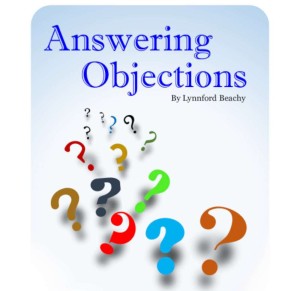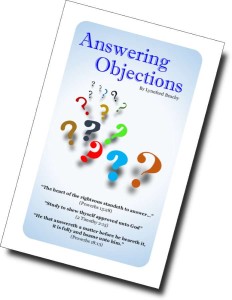 John 14:15, 16
John 14:15, 16
Jesus said, “If ye love me, keep my commandments. And I will pray the Father, and he shall give you another Comforter, that he may abide with you for ever”  (John 14:15, 16).
(John 14:15, 16).
The purpose of the gift of the Comforter is that He may abide with the disciples forever. This was excellent news to the disciples, for they were sad to hear of Christ’s soon departure. Jesus continued His discourse, stating that He would send “the Spirit of truth; whom the world cannot receive, because it seeth him not, neither knoweth him: but ye know him; for he dwelleth with you, and shall be in you” (John 14:17).
Jesus said that the world could not receive the Spirit of truth, because it did not see him nor know him. The world does not see that this gift is available to them, nor does it know the Person who is the Comforter.
Immediately following this explanation Jesus said something startling. He told His disciples, “but ye know him.” How could the disciples know the promised “Comforter, which is the Holy Spirit” (v. 26),* [Footnote: * Every time in the Bible where you find the term, “Holy Ghost,” it should have been translated “Holy Spirit.” Sometimes the translators of the Bible chose to translate πνευμα αγιον (pneuma hagion) into “Holy Ghost,” and other times they translated the same phrase as “Holy Spirit” (Luke 11:13). Holy Spirit is the most accurate translation.] if Jesus had not yet prayed for the gift, and it evidently had not yet been given? John stated, “the Holy Spirit was not yet given; because that Jesus was not yet glorified” (John 7:39).
Jesus explained, “…ye know him; for [or because] he dwelleth with you, and shall be in you” (John 14:17). Who was dwelling with the disciples? Jesus Christ! Jesus explained that soon this Person who was dwelling with them would be in them. It certainly would be better for the Comforter to dwell in the disciples rather than dwelling outside of them. That is exactly what Jesus said a short time later. In the same discourse, Jesus said, “I tell you the truth; It is expedient [profitable] for you that I go away: for if I go not away, the Comforter will not come unto you; but if I depart, I will send him unto you” (John 16:7).
Jesus said that His disciples would be better off if He left them, went to His Father, and sent the Comforter to dwell in them. He also pointed out that the coming of the Comforter depended upon His departure, and glorification. As long as Christ was living on the earth as a man, it was not possible for this promised Comforter to come to live in the disciples.
Jesus did not end His conversation in verse 17. In the next verse He said, “I will not leave you comfortless: I will come to you” (John 14:18). This sheds a great deal of light on the subject. It explains why the Comforter could not come until after Christ went away and was glorified, for Christ said that He, Himself, would come back to His disciples to comfort them.
Let’s continue reading Christ’s discourse to see how He reinforced this point. He said, “Yet a little while, and the world seeth me no more; but ye see me: because I live, ye shall live also. At that day ye shall know that I am in my Father, and ye in me, and I in you” (John 14:19, 20). A few moments earlier Jesus had said to His disciples that the Comforter “shall be in you.” Now, Jesus says that when the Comforter comes, “Ye shall know that I am in you.” Jesus assured His disciples that He would not send someone else to comfort them, but that He would come Himself to be their Comforter. Isn’t that beautiful! The disciples had become close friends of Christ; so close that John felt comfortable leaning on His bosom. It was a comfort to them when Christ was near. Now Jesus tells them some wonderful news. He tells them that after He goes to His Father, He would come back to them as the Comforter, and they would know that it was He who was dwelling in them—they would recognize that the same Person who was dwelling with them was now in them, by His Spirit.
Next, Jesus said something that caused one of His disciples to inquire of Him how this could take place. Jesus said, “He that hath my commandments, and keepeth them, he it is that loveth me: and he that loveth me shall be loved of my Father, and I will love him, and will manifest myself to him. Judas saith unto him, not Iscariot, Lord, how is it that thou wilt manifest thyself unto us, and not unto the world? Jesus answered and said unto him, If a man love me, he will keep my words: and my Father will love him, and we will come unto him, and make our abode with him” (John 14:21-23).
Many people believe that in John 14, Jesus was trying to teach His disciples that God is a trinity, that the Holy Spirit is a third member of the God family. Yet, when Jesus was asked to explain Himself He did not say, anything similar to “God is a trinity of persons.” Instead, Jesus made it abundantly clear that after He left the world, He would come back to make His abode in the hearts of His disciples. Not only would He return, but His Father would come with Him, so that both of Them would live in the hearts of His children; not physically, but by God’s Spirit. In this way, the disciples could have intimate communion and fellowship with both the Father and His Son. John emphasized this when he wrote, “That which we have seen and heard declare we unto you, that ye also may have fellowship with us: and truly our fellowship is with the Father, and with his Son Jesus Christ” (1 John 1:3).
At the beginning of Christ’s discourse at the last supper He said, “Let not your heart be troubled: ye believe in God, believe also in me. In my Father’s house are many mansions: if it were not so, I would have told you. I go to prepare a place for you” (John 14:1, 2). If the coming of the Comforter was more than both the Father and the Son, He would have told us. If God was made up of three persons, He would have told us. If the only true God was more than only the Father, Jesus would have told us. Instead, at the end of this discourse He said that His Father is “the only true God” (John 17:3).
If Jesus wanted us to believe that God is a trinity, He did a very poor job of explaining it. He had many opportunities to explain that God is a trinity, yet He never did. Not only did He fail to tell us God is a trinity, He made statements over and over again that are not in harmony with the doctrine of the trinity. If He wanted us to believe that God is a trinity, He made many statements that would serve only to confuse rather than to clarify. But “God is not the author of confusion” (1 Corinthians 14:33). Jesus wants us to believe that “there is one God; and there is none other but he,” “God the Father,” who is “the only true God” (Mark 12:32; John 6:27; 17:3).
John expressed the lovely truth of God, the Father, and His Son, Jesus Christ, living in us in several other verses. He wrote, “Whosoever transgresseth, and abideth not in the doctrine of Christ, hath not God. He that abideth in the doctrine of Christ, he hath both the Father and the Son” (2 John 1:9). In 1 John 2:22, 23 he wrote, “Who is a liar but he that denieth that Jesus is the Christ? He is antichrist, that denieth the Father and the Son. Whosoever denieth the Son, the same hath not the Father: (but). he that acknowledgeth the Son hath the Father also.” It is truly a blessing to have personal fellowship with both the Father and His Son, and I am very thankful that God has made this available to us.
